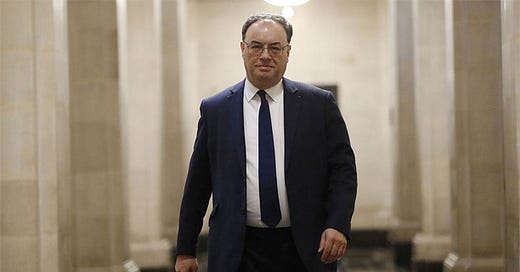Screwing Working People – to Protect Wall Street
Will impoverishing the 99% tackle inflation?
The governor of the Bank of England, Andrew Bailey, confessed to being “very well aware of the impact” (of a rate rise, and the Bank’s forecast of a recession) on what he euphemistically called “the least well-off”.
Thursday, 4th August, 2022 was rate-setting day for the Bank of England.
The day began with commentators on the BBC deploying arguments in defence of further rises in interest rates. Rate rises are needed, they implied, to tackle and bring down Britain’s rising inflation rate – driven, they also hinted, by high oil, gas and food prices.
Broadcasters could not bring themselves to ask the simple question: are working people really to blame for high inflation? Do high oil, gas and food prices have anything to do with the state of the British economy, its government or the decisions of its central bank? Do high prices have even less to do with the British workers whose wages have lagged inflation and other indicators for years?
Instead, high commodity prices are fixed globally by unregulated speculative players in globalised financial markets. In which case, higher interest rates for the domestic economy could have no short or even medium-term impact on price-setting in speculative markets.
Journalists struggle to grasp and express this truth. Instead of stating the facts of this globalised price-setting inflationary process, driven by problem gamblers on Wall St and in other financial entrepots - they dither. High inflation, they concede euphemistically, is driven by ‘international’ prices. Evan Davies, a BBC broadcaster with an economics background described these prices on the lunchtime news as ‘imported, world’ prices…
Why the need for euphemisms? Why not follow through on the logic of international, imported prices fixed at ‘world’ level – not at the level of the British economy?
The Oxford Language dictionary defines a euphemism as a: “a mild or indirect word or expression substituted for one considered to be too harsh or blunt when referring to something unpleasant or embarrassing.”
What is harsh, blunt or unpleasant about the expression: “Wall St speculators in the globalised financial system of unregulated commodity markets”? Why must speculators (and the public) be protected from the harsh, blunt or unpleasant truth?
The answer is of course that what was done on the 4th August by the Bank of England (and earlier by the Fed) was an attempt, not to tackle inflation by regulating unregulated price-setting in global commodity markets; but by deliberately inflicting a recession on the wider public.
The governor of the Bank of England, Andrew Bailey, openly admitted that the decision to inflict suffering on the poor makes him feel “uncomfortable” (a euphemism for guilt?). At the press conference to announce what amounts to the biggest rise in the central bank rate in many years, he confessed to being “very well aware of the impact“ (of a rate rise, and the Bank’s forecast of a recession) on what he euphemistically called “the least well-off”.
His justification for making the poorest people in the country suffer so that civil servants at the Bank of England can be relieved of the burden of regulating globalised commodity markets; and instead can protect the power of those markets - was straightforward:
“If we don’t bring inflation back to target” he said “and we get second round effects (a euphemism for wage rises)… it will get even worse for the least well-off in society.”
To put that euphemistically: we are poisoning you today, in the hope you survive, and to avoid the even more unpleasant task of doubling the dose and killing you in the future. You will find our treatment unpleasant. You may have to choose this winter between heating and eating. You may even die of malnutrition, from the despair of unemployment and from the agony of insufficient income for survival. We regret that. But the power of globalised speculators in financial markets must be defended at all costs to society – by central bankers and their friends in the media, by all mainstream political parties and by the economics profession.
The power of globalised speculators is also protected by large sections of ‘the left’ – those in progressive institutions collapse, cave in to the globalised and financialised system that drives the capital gains made by speculators in ‘world’ commodity markets.
Here at System Change we avoid euphemisms. We see what is happening and we demand that the system be fully, accurately and honestly exposed. Above all, we call for the radical transformation of the international financial system, a system designed, as the events of 4th August revealed, to protect the interests of the 1%, while impoverishing the 99%.





Such a lovely piece of clear writing that cam was a cool breeze on a very hot morning. Thank you.
Ann, you are onto something important here! But I am not surprised by BoE comments. Most of econ staff have thorough training in IS/LM frameworks: No space for globalized financial markets in that playing field!